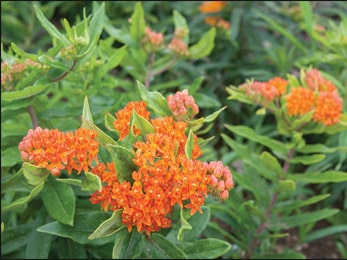
What is Pleurisy Root?
Pleurisy Root is an Ayurvedic herb which has been used in Ayurveda since centuries due to its great health benefits. The whole plant is beneficial according to the medicinal point of view especially roots of Asclepias tuberosa is for various respiratory ailments such as a cough, swelling of the lining of the lungs, swelling of airways (bronchitis), influenza, inflammation of air sacs in the lungs (pneumonitis). The other common name of the herb is milkweed, butterfly weed, Canada root, flux root, Indian paintbrush, and Indian posy.
Asclepias tuberosa is a perennial plant, growing up to the height of 0.3-1.0 meter. The plant mostly flavors the full sun, and mesic to dry condition for proper growth. It grows in the terrestrial area mostly in sandy and prairies areas. Asclepias tuberosa plant leaves are simple, lobed, unlobed, long, narrow lanced shaped, 12 cm long and 2-3 cm broad. The stems of the milkweed are not strong. Asclepias tuberosa contains a cluster of 5-parted flower at the top of hairy 1-2 foot leafy stem. The flowers are yellow or orange in color which appears in early summer to early autumn. People mostly called it butterfly weed because butterflies are attracted towards the plant due to its bright color. It is also a larval food plant for monarch butterflies. Bees, hummingbird, and insects are also attracted to the flowers of Asclepias tuberosa. The seeds of the plant are arranged in green seed pods. On maturity, the pods turn into brown color and later on release the seeds. The pods split vertically to release the seeds. This herb is extensively used by native Americans to treat a variety of ailments.
Classification
- Kingdom: Plantae
- Subkingdom: Tracheobionta
- Superdivision: Spermatophyta
- Division: Magnoliophyta
- Class: Magnoliopsida
- Subclass: Asteridae
- Order: Gentianales
- Family: Asclepiadaceae
- Genus: Asclepias L.
- Species: Asclepias tuberosa
Edible Uses of Pleurisy Root
In some countries, Asclepias tuberosa has been using as food. The flower buds, young shoot, seedpod, roots, and leaves are used as edible parts. The flower bud of Asclepias tuberosa tastes somewhat like peas. Asclepias tuberosa seed pods harvested and cooked before seed floss begins to form. The flower clusters are used and cooked to make a sugary syrup. In hot weather, the nectars of the flowers, which can we come out in small lumps can be eaten like sweet because they are very delicious. Edible oil is contained form the seeds of Asclepias tuberosa.
Medicinal Properties of Pleurisy Root
- Antispasmodic
- Carminative
- Cathartic
- Diaphoretic
- Diuretic
- Expectorant
- Vasodilator
Health Benefits of Pleurisy Root
The roots of the Asclepias tuberosa has shown many health benefits such as beneficial for various respiratory disorders such as cough, bronchitis, sore throat etc. Asclepias tuberosa roots are bitter, nutty-flavored tonic herb that provides relief from spasms and acts as an expectorant. We have here mentioned some effective health benefits of Asclepias tuberosa:
- The roots of the Asclepias tuberosa act as an expectorant and it provides relief from pain and inflammation of pleurisy. Pleurisy is the condition in which the inner lining of the chest cavity and the tissues which surround the lungs becomes inflamed which further causes the sharp chest pain mostly during breathing.
- The roots of the Asclepias tuberosa are also very effective during pneumonitis, which is associated with inflammation of lung tissues. This disorder contains symptoms like flu, fever, headache, cough, and shortness of breath. It helps in reduction of inflammation of lung tissue and reduces these symptoms.
- The herb is also used for treating various disorder related to stomach and digestion problems. Due to its great carminative and anti-spasmodic properties, it treats the common problems of digestion such as diarrhea, colic, indigestion, and flatulence.
- The analgesic property of Asclepias tuberosa herb provides relief from pain. Such as acute and chronic rheumatism pain, muscles pain, etc. In arthritis patient, it also reduces the inflammation of joints.
- Pleurisy has also been used for speeding up the healing process of the wound. It overcomes the infection of the wound and acts as a poultice. The Asclepias tuberosa herb is also helpful for the treatment of skin ulcer, injuries, and swelling.
- The herb also promotes the slow, steady and free perspiration by diminishing the excessive heat on the body which is beneficial for typhus, scarlet bilious, lung, rheumatic and another form of fever. During fever, herb brings down the body temperature and also reduce the body pain due to its analgesic property.
- The herb is typically used to treat minor skin disorders such as swelling, brushes, and wound. The antispasmodic property of herb may help in treating menstrual cramps and painful periods.
- The diuretic property of this herb is helpful to increase the flow of urine and by doing so it removes the excess of water and toxic substances from the body.
- Asclepias tuberosa also reduces the irritation and swelling of the mucous membrane. So it treats asthma and bronchitis.
Side Effects
- The excessive consumption of herb sometimes may cause heart issues.
- The roots also can cause nausea and vomiting
- If you are pregnant, must avoid this herb.
- It is also unsafe if you are breastfeeding.
Asclepias tuberosa has many medicinal properties and health benefits which we already mentioned above. You can try this potent natural herb during respiratory ailments such as a cough, asthma, bronchitis, and chest pain.
